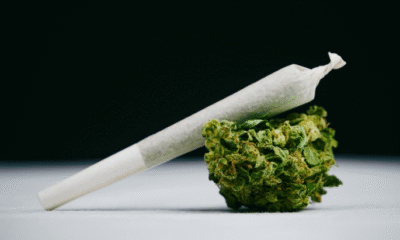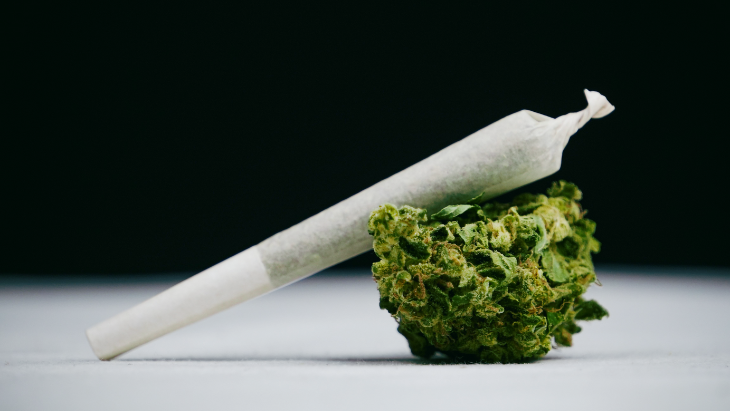featured
Chicago Police Can’t Search Vehicles Based on Smell of Raw Cannabis Under New Rules
Published
12 hours agoon

Chicago Police Department (CDP) officers will not be allowed to search vehicles based only on the smell of raw cannabis under a rule change approved by officials on Monday, WTTW reports.
Advocates had pursued the change under a 2019 federal court order requiring the department to reform its policies, and CPD officials agreed to the rule change despite initial objections. The American Civil Liberties Union of Illinois said in a Monday court filing that it “applauds” the department’s decision last month to adopt the policy change.
The change comes despite the Illinois Supreme Court ruling in 2024 that the smell of raw cannabis is sufficient grounds for police to conduct a vehicle search during a traffic stop. Three months earlier, however, the same court ruled that the smell of burnt cannabis is not sufficient grounds for searching a vehicle without a warrant.
CPD reported conducting just 70 traffic stops based on suspected cannabis violations from December 2024 to June 2025 — the department, however, does not track how many traffic stops occur based on the smell of raw cannabis, according to the report.
Adult-use cannabis is legal in Illinois; however, state law requires cannabis to be stored in a “sealed, odor-proof, child-resistant cannabis container” when being transported in a vehicle.
Get daily cannabis business news updates. Subscribe
Have an additional perspective to share? Send us a message to let us know, and if your comment is chosen by our editors it could be featured here.
Perspective to add? Suggest a revision or submit commentary for review using the form below.
Ganjapreneur is made possible by our partners:

Author: mscannabiz.com
MScannaBIZ for all you Mississippi Cannabis News and Information.
You may like
-


Federal Court Upholds Arkansas Hemp Restrictions, Contradicting Texas Governor’s Stance In Vetoing Proposed Ban In His State
-


NORML Op-Ed: Debunking Cannabis Potency Myths
-


Report 15% of NY Adults Use Cannabis
-


Rand Paul Files Bill To Triple Federal THC Limit For Hemp As House Pursues Crackdown On Consumable Cannabinoids
-


Marketshare of cannabis sleep aids skyrockets
-


US House Committee Approves Bill to Close THCA ‘Loophole,’ Ban Intoxicating Hemp Products
featured
Federal Court Upholds Arkansas Hemp Restrictions, Contradicting Texas Governor’s Stance In Vetoing Proposed Ban In His State
Published
30 minutes agoon
June 25, 2025
“Just because states may legalize hemp under the 2018 Farm Bill does not mean they must.”
By Bethany Blankley, The Center Square
Several of the reasons Texas Gov. Greg Abbott (R) made for vetoing a statewide THC ban, SB 3, were rejected Tuesday by the Eighth Circuit Court of Appeals.
The Texas legislature overwhelmingly passed SB 3 with bipartisan support during the regular legislative session. Late Sunday night, Abbott vetoed it.
In his proclamation explaining the veto, he said SB 3 was “well-intentioned. But it would never go into effect because of valid constitutional challenges.” If it were enacted, “its enforcement would be enjoined for years, leaving existing abuses unaddressed,” he said, adding that “Texas cannot afford to wait.”
He pointed to Arkansas enacting a THC ban in 2023, Act 629, which was challenged in court. A lower court halted it from going into effect, arguing it would “likely [be] preempted by federal statutes and that its criminal provisions were likely unconstitutionally vague,” Abbott said. “The result in Arkansas? Their law has sat dormant, meaningless, having no effect for nearly two years while further legal proceedings play out. That result must be avoided in Texas,” Abbott said.
Instead, he proposed regulating THC similar to how alcohol is regulated.
On Monday, Patrick challenged each of Abbott’s arguments, saying they were flawed and factually inaccurate. Federal law expressly permits states to impose their own restrictions, including banning THC, Patrick said. He also said the Fourth and Seventh circuits have ruled as much and California and Colorado banned THC with no problems, The Center Square reported.
He said he believed the 8th Circuit would rule in favor of Arkansas.
One day later, it did.
On Tuesday, a panel of judges on the Eighth Circuit, including the chief judge, reversed the lower court’s injunction.
The judges also confirmed Patrick’s argument, stating in their 16-page ruling that nothing in the 2018 Farm Bill “preempts or limits any law of a State or Indian tribe that…regulates production of hemp and is more stringent than this subchapter.”
They also said the Arkansas Supreme Court would reach the same conclusion they did.
“We predict that the Arkansas Supreme Court would hold that” a provision, the saving’s clause, was upheld in the law, agreeing with the state.
The judges rejected the plaintiff’s argument that the state’s ban prohibited interstate commerce of hemp products, also saying, “We predict the Arkansas Supreme Court would adopt our understanding of the phrase ‘continuous transportation.’ Any more of a restrictive understanding would mean that Act 629 would violate the 2018 Farm Bill’s Express Preemption Clause.”
The judges also point out that the “text of the 2018 Farm Bill shows only that Congress wanted to facilitate state legalization of hemp, if a state wants to. Congress allows states to legalize hemp by removing the biggest hurdle—federal criminalization.”
Today the United States Court of Appeals for the Eighth Circuit reversed a lower court’s decision to enjoin Act 629 of 2023. Today’s ruling isn’t just a win for Arkansas, it’s a win for common sense and the rule of law. If you are selling these products, you are now doing it in… pic.twitter.com/whLQwGHMc8
— Attorney General Tim Griffin (@AGTimGriffin) June 24, 2025
The text of the 2018 Farm Bill “does not support” the plaintiff’s claim “that Congress intended to ‘federally protect[] hemp’ and coercively mandate nationwide legality,” the judges said. “States may obtain primary regulatory authority over hemp production,” including banning it.
“Instead, just because states may legalize hemp under the 2018 Farm Bill does not mean they must,” the judges note.
The judges also rejected the argument Abbott cited, saying the Arkansas bill “is not unconstitutionally vague and the district court abused its discretion when it issued a preliminary injunction based on the statute being void for vagueness.”
As I said yesterday at my press conference, it appeared to my legal team and me that Arkansas would win this case and be able to ban THC. The 8th Circuit Court of Appeals had telegraphed that this was going to be their decision in their oral arguments.
This is the second major…
— Office of the Lieutenant Governor Dan Patrick (@LtGovTX) June 24, 2025
In response to the ruling, Patrick said the court ruled the way he believed it would and the Texas Senate would reintroduce SB 3 and the state legislature would pass it again.
Abbott called a special session for next month, adding SB 3 to the agenda, suggesting that the legislature implement a series of regulations to legalize THC.
To be clear, the Arkansas law differs from S.B. 3 in legally consequential ways. Unlike the Texas bill, Arkansas’ law did not ban “any amount” of a cannabinoid, it expressly permitted hemp farming consistent with federal law, and it carved out interstate transportation. Those are…
— Greg Abbott (@GregAbbott_TX) June 25, 2025
The Republican Party of Texas opposes legalizing marijuana; the majority of Republicans in the legislature voted to ban it, not regulate it.
When the legislature convenes next month, Patrick said, “All we have to do is pass SB 3, just like we passed during the regular session.”
This story was first published by The Center Square.
Photo courtesy of Brendan Cleak.

Author: mscannabiz.com
MScannaBIZ for all you Mississippi Cannabis News and Information.


From the onset of marijuana prohibition, criminalization advocates sought to advance their agenda — an unduly influence to the public — by sensationalizing the supposed strength of cannabis.
In the 1930s, while lobbying for the first-ever federal ban on cannabis, Bureau of Narcotics Commissioner Harry Anslinger alleged that the marijuana of a century ago was so uniquely potent that it was “entirely the monster Hyde, the harmful effect of which cannot be measured.”
Since then, legalization opponents have repeatedly alleged that cannabis’ potency has exponentially grown stronger. Testifying before Congress in 1996, then-Sen. Joe Biden opined that the potency of 1990s weed was unlike anything America had ever seen. “It’s like comparing buckshot in a shotgun shell to a laser-guided missile,” he said.
Modern day prohibitionists continue to engage in this same rhetorical tactic.
Let’s set the record straight. First, the availability of higher potency cannabis products is not a phenomenon unique to today’s state-legal markets. In fact, more potent products like hashish have always been publicly available.
Typically, when consumers encounter higher strength marijuana, they ingest lesser quantities of it. This self-regulatory process is known as self-titration.
Second, higher potency marijuana products do not dominate state-legal markets. In fact, retail sales records from legal states show that most consumers tend to prefer and gravitate toward lesser strength products.
Third, unlike alcohol (which is readily available in a variety of potencies, including highly-potent formulations like grain alcohol and absinthe), THC is incapable of causing lethal overdose — regardless of its potency or the quantity consumed.
That’s not to say that cannabis products cannot be over-consumed. They can. But in such instances, consumers typically experience only temporary dysphoria (commonly referred to as a panic attack) — the effects of which dissipate within a few hours. (By contrast, alcohol overconsumption is associated with some 2,200 overdose deaths annually.)
Nonetheless, in order to discourage overconsumption, most states regulate certain cannabis products, like edibles, to single serving sizes. All legal states require that products’ potencies appear on their labels so consumers can make informed decisions prior to consuming them.
In some instances, overexposure to higher strength products might induce temporary psychotic-like symptoms. However, such incidents are exceedingly rare and are typically exclusive to those who are either predisposed to or have a preexisting psychiatric disorder. (Notably, exposure to high-potency alcohol also triggers psychosis in certain consumers.)
Specifically, an exhaustive study published in the Journal of the American Medical Association determined that “state medical and recreational cannabis policies were not associated with a statistically significant increase in rates of psychosis-related health outcomes.”
Overall, most Americans are happy with cannabis legalization. Thirteen years into states’ marijuana legalization experiment, public support for making marijuana legal nationwide has never been higher. To date, 24 states have legalized the adult-use market. None of these states have everrepealed their legalization laws. That’s because these policies are working largely as voters and politicians intended — and because they are preferable to cannabis criminalization.
Ultimately, any potential harms associated with cannabis are best mitigated by a policy of legalization, regulation and education. They are only exacerbated by criminalization, sensationalism and stigmatization.
A version of this op-ed was initially published in The Atlanta Journal-Constitution.
Related

Author: mscannabiz.com
MScannaBIZ for all you Mississippi Cannabis News and Information.
featured
Rand Paul Files Bill To Triple Federal THC Limit For Hemp As House Pursues Crackdown On Consumable Cannabinoids
Published
3 hours agoon
June 25, 2025
As the hemp industry raises concerns about congressional attempts to ban most consumable cannabinoid products, a GOP senator has filed a bill that would triple the concentration of THC that the crop could legally contain, while addressing multiple other concerns the industry has expressed about federal regulations.
Sen. Rand Paul (R-KY) introduced the legislation, titled the Hemp Economic Mobilization Plan (HEMP) Act, last week. It mirrors versions he’s sponsored over the last several sessions.
Hemp and its derivatives were legalized under the 2018 Farm Bill, but the industry has experienced multiple setbacks in the years since—and the proliferation of intoxicating cannabinoid products has led to pushes in Congress and state legislatures across the country to reign in the largely unregulated market.
To that point, a GOP-led House committee this week approved a spending bill containing provisions that hemp stakeholders say would devastate the industry, prohibiting most consumable cannabinoid products that were federally legalized during the first Trump administration.
The legislation would “effectively” criminalize hemp-derived cannabinoid products, including CBD, according to a Congressional Research Service (CRS) report.
In contrast, the newly reintroduced measure from Paul would address one of the most common complaints that lawmakers have heard from hemp businesses under the current law, which is that the crop is federally defined as containing no more than 0.3 percent THC by dry weight. They say that’s too low, and so the bill would increase that threshold to 1 percent.
It would also address potential problems with testing requirements under U.S. Department of Agriculture (USDA) regulations. Hemp processors currently get a 15-day window to test the crop’s flower to ensure that the THC concentration is within the allowed limits. But testing flower can be onerous and farmers have said it would stretch their resources thin, not to mention that the plant’s THC is significantly impacted by external factors.
To fix that issue, the bill calls for final hemp products themselves to be tested, rather than the initial flower from the plant.
The legislation also sets documentation requirements for people transporting hemp shipments, intended to prevent further instances of law enforcement seizing the legal crop, believing it to be illicit marijuana. The bill expands the type of documentation that people could possess to demonstrate product legality.
Whereas the initial version of Paul’s measure filed in 2020 would have required them to carry a certificate from a lab demonstrating that the product contains no more than 1 percent THC, they could now instead choose to simply bring a copy of the hemp producer’s license.
While stakeholders would welcome the senator’s proposal, there’s also significant anxiety within the industry about the separate legislation that would significantly upend the hemp market that’s developed over the last several years.
While report language attached to the 2026 appropriations bill was recently amended to clarify lawmakers’ intent not to disrupt the non-intoxicating cannabinoid market—signaling that products like CBD shouldn’t be banned—the legislation itself hasn’t changed and could still jeopardize the industry without further amendments to its provisions.
Hemp industry stakeholders rallied against that proposal, an earlier version of which was also included in the base bill from the subcommittee last year. It’s virtually identical to a provision of the 2024 Farm Bill that was attached by a separate committee last May via an amendment from Rep. Mary Miller (R-IL), which was also not enacted into law.
A leading alcohol industry association, meanwhile, has called on Congress to dial back language in the House spending bill that would ban most consumable hemp products, instead proposing to maintain the legalization of naturally derived cannabinoids from the crop and only prohibit synthetic items.
Members of Wine & Spirits Wholesalers of America (WSWA) also met with lawmakers and staffers in April to advocate for three key policy priorities that the group says is based on “sound principles of alcohol distribution.” They include banning synthetic THC, setting up a federal system for testing and labeling products and establishing state-level power to regulate retail sales.
Separately, key GOP congressional lawmakers—including one member who supports marijuana legalization—don’t seem especially concerned about provisions in the new spending bill that would put much of the hemp industry in jeopardy by banning most consumable products derived from the plant.
—
Marijuana Moment is tracking hundreds of cannabis, psychedelics and drug policy bills in state legislatures and Congress this year. Patreon supporters pledging at least $25/month get access to our interactive maps, charts and hearing calendar so they don’t miss any developments.![]()
Learn more about our marijuana bill tracker and become a supporter on Patreon to get access.
—
Jonathan Miller, general counsel of the U.S. Hemp Roundtable, told congressional lawmakers in April that the market is “begging” for federal regulations around cannabis products.
At the hearing, Rep. James Comer (R-KY) also inquired about FDA inaction around regulations, sarcastically asking if it’d require “a gazillion bureaucrats that work from home” to regulate cannabinoids such as CBD.
A report from Bloomberg Intelligence (BI) last year called cannabis a “significant threat” to the alcohol industry, citing survey data that suggests more people are using cannabis as a substitute for alcoholic beverages such a beer and wine.
Last November, meanwhile, a beer industry trade group put out a statement of guiding principles to address what it called “the proliferation of largely unregulated intoxicating hemp and cannabis products,” warning of risks to consumers and communities resulting from THC consumption.
Read the text of the HEMP Act below:
Photo courtesy of Max Pixel.

Author: mscannabiz.com
MScannaBIZ for all you Mississippi Cannabis News and Information.

Federal Court Upholds Arkansas Hemp Restrictions, Contradicting Texas Governor’s Stance In Vetoing Proposed Ban In His State

NORML Op-Ed: Debunking Cannabis Potency Myths

Report 15% of NY Adults Use Cannabis
Rand Paul Files Bill To Triple Federal THC Limit For Hemp As House Pursues Crackdown On Consumable Cannabinoids

Marketshare of cannabis sleep aids skyrockets

US House Committee Approves Bill to Close THCA ‘Loophole,’ Ban Intoxicating Hemp Products

House Votes To Let VA Doctors Recommend Medical Marijuana To Military Veterans And To Support Psychedelics Research

World-Class Growing Solutions | Cannabis Business Times

Summers are better with Flav

Nebraska Medical Cannabis Commission Proposal Will ‘Destroy Patient Access,’ Advocates Say

Circuit Court Ruling for Arkansas Renders Texas Governor’s Hemp Veto Argument Moot

Jones Soda Co. Sells Mary Jones THC Beverage Brand

Feds Say Tourist Who Admitted To Prior Marijuana Use In Legal Places Was Denied Entry To US Over Drugs—Not Bald JD Vance Meme

The PFAS Threat in Cannabis and Hemp: What You Need to Know

Chicago Police Can’t Search Vehicles Based on Smell of Raw Cannabis Under New Rules

Marijuana Opponents ‘Have Lost’ The Debate, GOP Senator Says, Arguing ‘It’s Time’ To Regulate It Like Alcohol And Tobacco

How much do you know about Pennsylvania’s medical marijuana program? Take our quiz.

Verano Unveils Bodega-Style Dispensary Experience at Zen Leaf Cave Creek in Phoenix

Congress to vote on cannabis & psychedelics amendments this week (Newsletter: June 25, 2025)

Rockford teen intended to deliver 300+ grams of cannabis, police say

El Paso cannabis shops relieved after Gov. Abbott vetoes ban on THC products

More older adults are using cannabis, study says

Marijuana use rising among seniors, and doctors are sounding alarms

More older Americans are using marijuana, according to new data

Alert: Department of Cannabis Control updates data dashboards with full data for 2023

Connecticut Appoints The US’s First Cannabis Ombudsperson – Yes there is a pun in there and I’m Sure Erin Kirk Is Going To Hear It More Than Once!

5 best CBD creams of 2024 by Leafly

Free delta-9 gummies from Bay Smokes
New Study Analyzes the Effects of THCV, CBD on Weight Loss

EU initiative begins bid to open access to psychedelic therapies

Mississippi city official pleads guilty to selling fake CBD products

May 2024 Leafly HighLight: Pink Runtz strain

Curaleaf Start Process Of Getting Their Claws Into The UK’s National Health System – With Former MP (Resigned Today 30/5/24) As The Front Man

5 best autoflower seed banks of 2024 by Leafly

Horn Lake denies cannabis dispensary request to allow sale of drug paraphernalia and Sunday sales | News

Discover New York’s dankest cannabis brands [September 2024]

Nevada CCB to Accept Applications for Cannabis Establishments in White Pine County – “Only one cultivation and one production license will be awarded in White Pine County”

Press Release: CANNRA Calls for Farm Bill to Clarify Existing State Authority to Regulate Hemp Products

Local medical cannabis dispensary reacts to MSDH pulling Rapid Analytics License – WLBT

6 best CBD gummies of 2024 by Leafly

5 best THC drinks of 2024 by Leafly

The Daily Hit: October 2, 2024

5 best delta-9 THC gummies of 2024 by Leafly

People In This State Googled ‘Medical Marijuana’ The Most, Study Shows

Weekly Update: Monday, May 13, 2024 including, New Guide for Renewals & May Board meeting application deadline

Thailand: Pro-cannabis advocates rally ahead of the government’s plan to recriminalize the plant

PRESS RELEASE : Justice Department Submits Proposed Regulation to Reschedule Marijuana

Press Release: May 9, STIIIZY and Healing Urban Barrios hosted an Expungement Clinic & Second Chance Resource Fair
Trending
-

 California Cannabis Updates1 year ago
California Cannabis Updates1 year agoAlert: Department of Cannabis Control updates data dashboards with full data for 2023
-

 Breaking News1 year ago
Breaking News1 year agoConnecticut Appoints The US’s First Cannabis Ombudsperson – Yes there is a pun in there and I’m Sure Erin Kirk Is Going To Hear It More Than Once!
-

 best list11 months ago
best list11 months ago5 best CBD creams of 2024 by Leafly
-

 Bay Smokes12 months ago
Bay Smokes12 months agoFree delta-9 gummies from Bay Smokes
-

 cbd1 year ago
cbd1 year agoNew Study Analyzes the Effects of THCV, CBD on Weight Loss
-

 Business9 months ago
Business9 months agoEU initiative begins bid to open access to psychedelic therapies
-

 Mississippi Cannabis News1 year ago
Mississippi Cannabis News1 year agoMississippi city official pleads guilty to selling fake CBD products
-

 California1 year ago
California1 year agoMay 2024 Leafly HighLight: Pink Runtz strain

